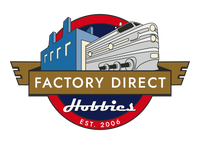Detailed Information
ATSF FEATURES:
- F7 Phase I
- Freight pilot (A-units)
- 36” fan-equipped dynamic brakes
- Nose & rear lift lugs
- Dual single-note air horns (A-units)
- Back-up lights with red lenses per prototype practice
With hundreds of F-units on the roster, Santa Fe owned numerous variations of the type. Two unique versions are represented in this release.
Units 261L and 265C are F7A locomotives delivered without stainless-steel grilles, giving them a unique appearance somewhere between that of an F3 and an F7. They are painted in the blue-and-yellow freight scheme.
Units 257L and 257A were among a handful of true dual-service units on the roster. Santa Fe owned several freight units with steam lines that could be used as emergency passenger power- but the 257 was distinctive in that it carried steam generators in the B-units. The units were still geared for freight service (65 mph), but often found themselves pressed into passenger service as well. They are painted in the cat-whisker scheme.
ROAD NUMBER SPECIFIC FEATURES:
#261L
- Modernized grab iron configuration - grabs on side & top of nose
- cut skirts
- F3 style chicken wire grills - delivered without stainless steel grills
- Spark arrestors included to represent later appearance (to be installed by consumer)
- Can-style antenna
- inertial air filter installed
#265C
- Modernized grab iron configuration - grabs on side & top of nose
- cut skirts
- F3 style chicken wire grills - delivered without stainless steel grills
- Spark arrestors included to represent later appearance (to be installed by consumer)
- Can-style antenna
- inertial air filter installed
#257L
- ”Stainless steel” grills
- as-delivered grab iron configuration
- as-delivered skirts
- inertial air filter included to represent later version (to be installed by consumer)
- B-unit equipped with steam generator. Both units equipped with water fills
#267A
- ”Stainless steel” grills
- as-delivered grab iron configuration
- as-delivered skirts
- inertial air filter included to represent later version (to be installed by consumer)
- B-unit equipped with steam generator. Both units equipped with water fills
F-UNIT SERIES LOCOMOTIVE FEATURES:
- Coupler cut levers
- Trainline and MU hoses
- Windshield wipers
- Lift rings
- Wire grab irons
- Sanding lines
- Lit signal lights and/or beacons, if equipped
- Bell placement & type per prototype
- Directional constant lighting
- Headlight brightness remains constant
- Separately-applied photo-etched metal and injection molded detail parts
- Detailed fuel tank with fuel fillers, fuel gauges, breather pipes & retention tanks
- Speed recorder unless noted
- See-through cab windows and full cab interior
- Etched metal fan grilles
- Body-mounted McHenry® scale knuckle couplers - Kadee® compatible
- DCC-ready features Quick Plug™ plug-and-play technology with 21-pin NEM connector
- Scaled from prototype resources including drawings, field measurements, photographs, and more
- Accurately painted and printed paint schemes
- Genesis driveline with 5-pole skew wound motor, precision machined flywheels, and multi-link drivetrain
- All-wheel drive with precision gears for smooth & quiet operation
- All-wheel electrical pickup provides reliable current flow
- Wheels with RP25 contours operate on all popular brands of track
- LED Lighting for realistic appearance
- Heavy die-cast frame for greater traction and more pulling power
- Packaging securely holds for the model for safe storage
- Minimum radius: 18” — Recommended radius: 22”
PROTOTYPE SPECIFIC INFORMATION
EMD F-units were a line of diesel-electric locomotives produced between November 1939 and November 1960 by General Motors Electro-Motive Division and General Motors-Diesel Division. Final assembly for all F-units was at the GM-EMD plant at La Grange, Illinois and the GMDD plant in London, Ontario, Canada. They were sold to railroads throughout the United States, Canada, and Mexico.
Structurally, the locomotive was a carbody unit, with the body as the main load-bearing structure, designed like a bridge truss and covered with cosmetic panels. The so-called bulldog nose was a distinguishing feature of the locomotive’s appearance, and made a lasting impression in the mind of the traveling public.
The F-units were the most successful “first generation” road (main line) diesel locomotives in North America and were largely responsible for superseding steam locomotives in road freight service. Before this, diesel units were mostly only built as switcher locomotives, and only used in rail yards.
F-units were sometimes known as “covered wagons”, due to the similarity in appearance of the roof of an F-unit to the canvas roof of a Conestoga wagon, an animal-drawn wagon used in the westward expansion of the United States during the late 18th and 19th centuries. When a train’s locomotive consist included only F-units, the train would then be called a wagon train. These two usages are still popular with the railfan community.
Specifications
| DCC: |
Ready/21-Pin NEM |
| SOUND: |
Ready |
| PROTOTYPE MANUFACTURER: |
EMD |
| Axles: |
4 |
| LIGHTED: |
LED Lighting |
| Minimum Age Recommendation: |
14 years |
| Is Assembly Required: |
No |





